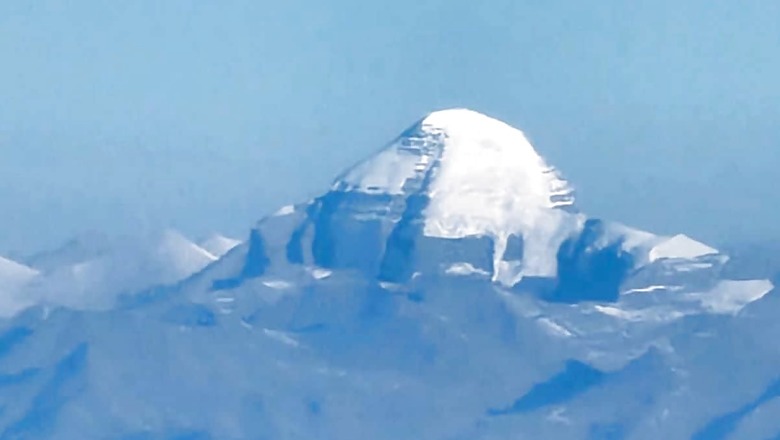
views
It is the fifth consecutive year since 2020 when both official routes for the holy Kailash Mansarovar Yatra remain closed for Indians. The private route through Nepal, which was opened last year by China, is unavailable for Indians for all practical reasons given the tough rules brought in by China.
Covid-19 remains the ostensible reason for suspension of the Kailash Mansarovar Yatra to Mount Kailash in China, the holy abode of Lord Shiva which has great reverence for Hindus. But dig a bit more and it becomes clear that this is another tactic by China since tensions arose between the countries on the Line of Actual Control in 2020.
News18 has obtained RTI replies furnished by the Ministry of External Affairs regarding the Kailash Mansarovar Yatra, with copies of two agreements signed with China in 2013 and 2014. Both the agreements make it clear that China cannot unilaterally terminate the agreements without prior notice. Any modifications have to be through consensus, they say.
CHINA VIOLATING AGREEMENTS?
Is China in violation of these agreements? The first one, on May 20, 2013, was signed between then Foreign Minister Salman Khurshid and Wang Yi, then Foreign Minister of China. This opened the Lipulekh Pass route for the yatra. The second agreement was signed by Sushma Swaraj as Foreign Minister with Yi in 2014 on September 18, 2014 to start the Nathu La Pass route for the Kailash Mansarovar Yatra.
What do these agreements say? The first one says the protocol came into effect from the day of signing in 2013 and shall be valid for a period of five years, and shall be automatically extended for a further period of five years at a time. This is unless either side gives a notice to the other in writing, six months ahead of the date of expiry, of its intention to terminate the protocol.
“The two sides can modify and supplement the Protocol as necessary through consensus,” the agreement says. The language of the second agreement is also identical.
Further, the first agreement said that each year, a large number of Indian pilgrims visit Mt Kailash and Mansarovar through commercial tour operators and travel agents. “The Chinese side agrees to provide necessary facilities and support to these pilgrims as well in accordance with its domestic laws and regulations,” the agreement says.
The second agreement was to allow Indian pilgrims, who go through tour operators and travel agents, to enter or exit China through the Nathu La Pass. The implementation of modalities of this route was through diplomatic channels.
The third option for Indians was to go to Nepal and then enter China through private operators. In all cases, Indians needed visas from China to visit Mt Kailash and Mansarovar.
INDIA LOOKS AT OPTIONS
While both official routes are closed since, China opened its borders from the Nepal side last year, but tightened rules for foreigners, especially Indians, and put multiple restrictions, including hiking the fee, making it practically impossible for Indians to go to Mt Kailash through Nepal.
This year in January, 38 Indians were the first to take a chartered flight, ‘Kailash Mansarovar Darshan Flight’, from Nepalgunj in Nepal to get aerial darshan of Mt Kailash from 27,000 feet in the air.
India has also developed a spot in its territory at Lipulekh peak in Dharchula of Pithoragarh, Uttarakhand, from where Mount Kailash can soon be clearly viewed from a distance of just 50 km. Earlier this month, the Uttarakhand government announced that pilgrims would be able to view Mount Kailash from this spot from September 15 this year. This will involve a vehicle drive up to Lipulekh and a trek of about 800 meters on foot to reach the vantage point to view Mt Kailash.
The big question, however, that remains is can China continue to unilaterally block the access of Indians to Mt Kailash and Mansarovar, among the holiest sites for Hindus, in apparent violation of the agreements it signed with India?
Those who have been to Mt Kailash would agree that there is no better spiritual experience than doing a parikrama in person of the holy mountain and Mansarovar and India must intervene strongly.




















Comments
0 comment